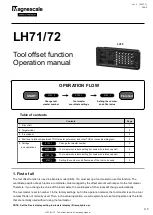
5/5
LH71/LH72 Tool offset function Operating manual
2.
Make a reference plane on the right edge of the workpiece. Cut the right
end face with a cutting tool by an appropriate amount.(Fig. 2)
After cutting to the extent that the center is left a little, leave the Z axis as it
is without moving it.
3.
This surface is used as the reference surface of the workpiece. Set the Z
axis to “0.0” without moving the Z axis.
This completes the Z-axis reference (offset value).
4
.
Next, set the X-axis reference (offset value).
The workpiece is cut and fed in the X-axis direction (Fig. 3).
5.
The diameter of the workpiece in the cut part is measured without
moving the X axis. (Fig. 4)
Enter the measured value on the X-axis.
For example, if the diameter of the cut part is 40 mm, operate as follows.
This completes the tool offset for tool # 1.
When the turret, bite, etc. become obstacles and the diameter cannot
be measured:
You can move the axis freely by holding the displayed value. After moving
the axis to a position where it can be measured, measure the workpiece
and enter the measured value.
Example of hold operation for X-axis display
Press the X-axis key and press key.
If you want to enter a different tool offset, change the tool number and repeat steps 1-5 in step 3.
If the tip of the cutting tool is worn, the machining dimensions are misaligned, or the sharpness is getting worse, replace the
cutting edge of the cutting tool or polish the cutting edge, and then perform
steps 1 to 5 in step 3
to reset the value.
Fig.2
Φ50.0
Workpiece reference surface processing (right end
surface Z axis)
TOOL1
Fig.3
Φ50.0
Workpiece reference surface processing
(diameter X-axis)
TOOL1
Reference plane
Fig.4
Φ50.0
Measurement of workpiece machining
dimensions (diameter)
TOOL1
40.0
Center
Z axis
(Middle)
X axis
(Upper)
When entering a different tool offset
When the tip of the cutting tool is worn, the offset value is deviated, or the
sharpness is getting worse
Reference plane























